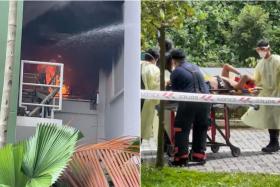Seniors must make sure they are fit to drive
The fatal accident in Queensway on Friday was the second incident in March where a taxi driver blacked out behind the wheel.
In the first incident on March 8, a senior cabby fainted driving on the East Coast Parkway and collided with the centre divider. His passenger was unhurt.
In Friday's accident, a woman, 66, was killed after a taxi beat a red light at Queensway and turned right to Alexandra Road where it hit a group of pedestrians.
Its 72-year-old driver had blacked out before the accident.
With an increasing ageing population, it is inevitable that there will be more elderly drivers on our roads, two road safety experts told The New Paper yesterday.
They feel these ageing drivers must take responsibility for their own health to ensure they are fit to drive.
All it takes is a split-second loss of concentration or poor reflexes to cause an accident that could lead to the loss of lives, said Mr Gerard Pereira, the training manager of the Singapore Safety Driving Centre.
"Driving while unwell or tired is a danger to the driver, passengers and other road users," he added.
Singapore Road Safety Council chairman Bernard Tay said that risks associated with older drivers could be mitigated if more regular and stringent health check-ups are put in place for all drivers, especially commercial drivers.
He said: "While older drivers are now required to have a check-up once a year, it might not be enough. It might need to be more regular.
"When it comes to health, a lot can change in a year, especially if someone has a serious medical issue. They need to see a doctor, perhaps at least every three months, particularly if medication is required."
He added that while subsidies are in place to encourage older individuals to get regular check-ups, regular tests, such as those done every three months, are not mandated by law.
Mr Tay said: "Maybe it could be worth relooking the rules (for older drivers)."
Mr Pereira said commercial drivers must also be responsible about the number of hours they spend behind the wheel.
"After four hours, they should stop and take a break, and by break, I mean actually get out of the car and stretch or have a coffee," he said.
"After sitting too long and concentrating on busy roads for hours, drivers need to rest.
"Whether they black out because of tiredness or a health issue, drivers should be responsible and not drive if they feel unwell or tired, no matter how short the distance they need to travel."
Get The New Paper on your phone with the free TNP app. Download from the Apple App Store or Google Play Store now



